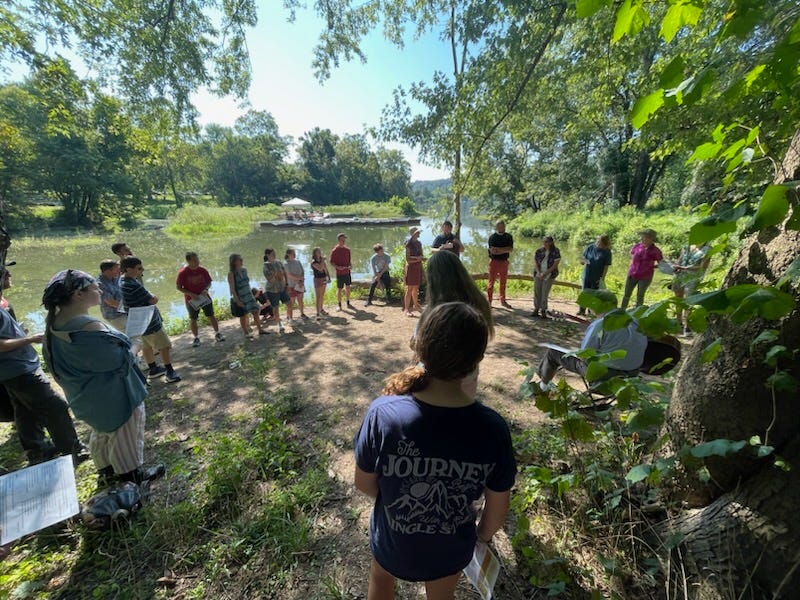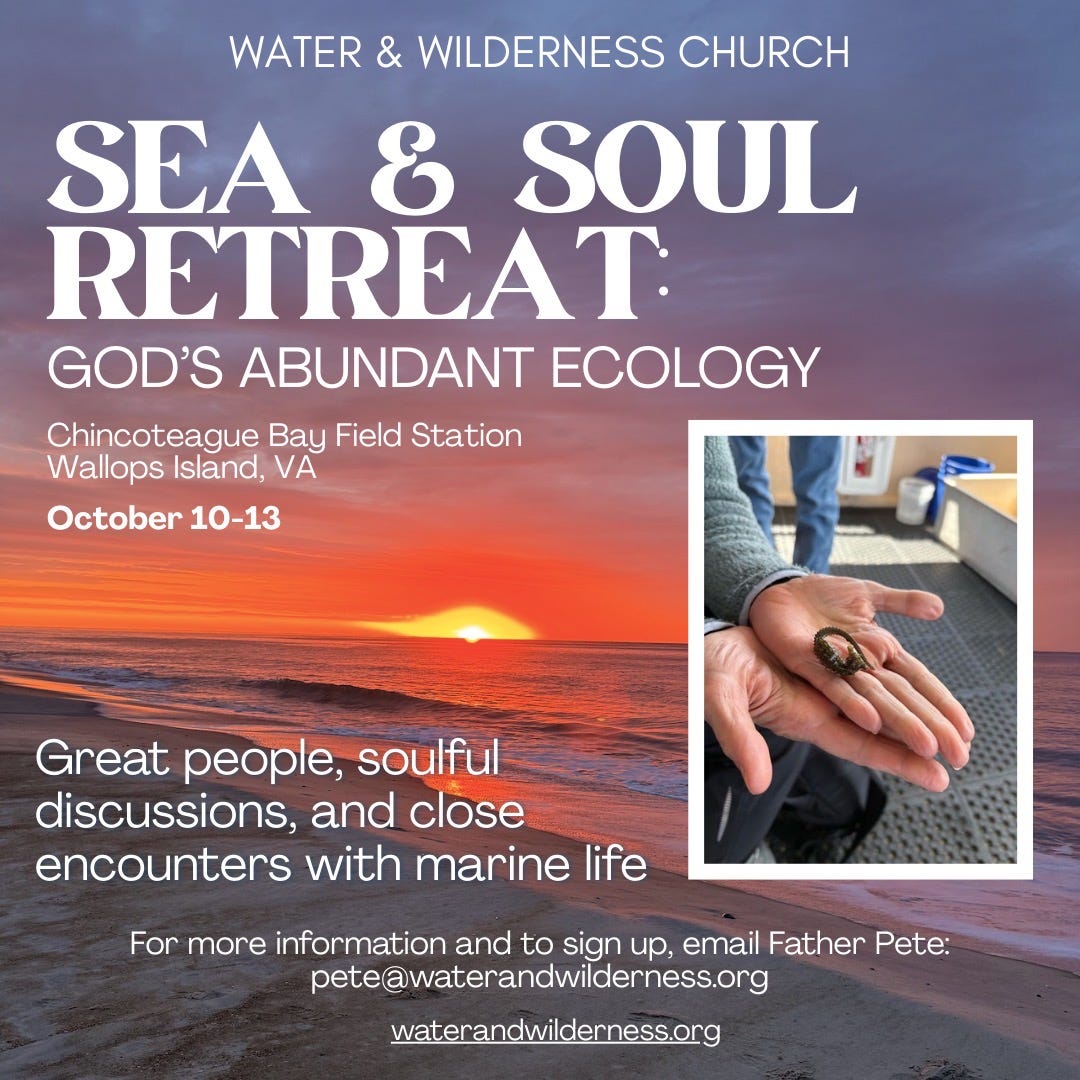Yesterday at Water and Wilderness Church something happened that can only happen when we make space for God to break up and break into our traditional way of doing things. For those of you who don’t know, WWC is a fully outdoor church I’m planting in the Diocese of Washington (DC). I bring everything we need in my truck: altar (a foldable table), guitar, chalice and paten, bread and wine, and we walk and worship together in God’s abundant creation. But yesterday as I was driving to the park, I realized I forgot the bread. Shit.
I took a breath. Ok. Liturgically and theologically we should have bread, but we don’t need bread; the church holds that full communion exists in either element, and we had wine. Then I remembered Teilhard de Chardin, and his Mass on the World:
Since once again Lord… I have neither bread, nor wine, nor altar, I will raise myself beyond these symbols, up to the pure majesty of the real itself; I, your priest, will make the whole earth my altar and on it will offer you all the labours and sufferings of the world…This bread, our toil, is of itself, I know, but an immense fragmentation; this wine, our pain, is no more, I know, than a draught that dissolves. Yet in the very depths of this formless mass you have implanted —and this I am sure of, for I sense it — a desire, irresistible, hallowing, which makes us cry out, believer and unbeliever alike: ‘Lord, make us one.’
An idea fired in my mind that I thought would be a perfect aubatitute for the bread, in the spirit of Teilhard. Ok, I thought. This will have to do.
The service began as it always does, with people gathering under a large shady tree by the parking lot, slowly circling naturally around the altar with a chalice of wine and (this time) an empty paten. After singing and praying, we walked into the green forest to our first stop where we read the gospel. Last Sunday it was the Good Samaritan parable.
During the homily, which is a shared discussion of the gospel, a member of WWC shared a personal story of struggle, and not receiving help from multiple priests. They were temporarily homeless and food was a challenge. The problem was, food banks gave out flour but not actual bread. “I needed bread, not flour.” The other problem was churches will sometimes pay for specific bills, but not just give money to people who need it, because it has to be tracked and accounted for so as not to lead to financial malfeasance. (I hate this rule so much. If we ever needed proof that church prioritizes culture over gospel, this is a great example.)
We walked further upriver to our final spot where the forest opens up and the river is in full view. We took a few minutes of solo meditation, pondering what it means to be the Samaritan and help the person in the ditch. We prayed for the lost and broken, and gave thanks for all God’s blessings in this tragic, beautiful life, and it was time for communion. After I told the story of salvation, a free-form story of God’s relentless pursuit of us through the ages despite any evidence that we deserve it, I asked God to send the Spirit into the bread and the wine.
The bread for today, I said, is our own broken bodies. Our frailty, our tears and broken dreams, the lives we live. We will share this bread by passing on a hug, from one body to the next, like a wave. And so with a somber joy on the banks of the river we passed a holy embrace from one broken body to another, sharing our own living sign of God’s grace. Being God’s grace. Just before it happened I realized who would receive the last hug. I watched, transfixed, as the quiet, resolute love, the broken body of Christ, made its way around the circle, touching each one of us in its path. Bodies healing bodies. Ashes not to ashes, but to seeds. Finally this wave of hugs came crashing with the full weight of Christ into the young person who needed bread. Suddenly I remembered a phrase I’d forgotten to say a few minutes earlier. “This is my body, given for you.” Sometimes Jesus, the bread of life, uses our own bodies to say it. And then, “I am the bread of life.”
A Note on Water and Wilderness Church
WWC is more than a church in DC, it’s a watershed community of the heart. We are a living response to the crisis of climate and domination, anxiety and isolation. Our worship, zoom book clubs, forums, service projects, and in-person retreats are offered for the spiritual nourishment of anyone, anywhere who finds God in nature and one another. We’d love for you to join our community in any way. In fact, we need what you bring in order to be fully us. A great entry point is our Sea and Soul retreat Oct 10-13 at the Chincoteague Bay Field Station. We’ll dive into the ocean ecology with hands-on experiences led by marine educators, connecting faith and expanding our souls with God’s abundant creation. Message me for more information.
Worship is at 5pm on the 2nd and 4th Sundays at Fletcher’s Cove/Boathouse in DC. Weekly worship begins Sept 14. Meet in the lower lot by the river. Bring some extra bread.






What a beautiful moment (and genius on your part). Thank you for sharing.
You are so open to Christ's word that you found a perfect "Bread." This is a deeply moving story. Thanks again, Fr. Pete. Love you too!